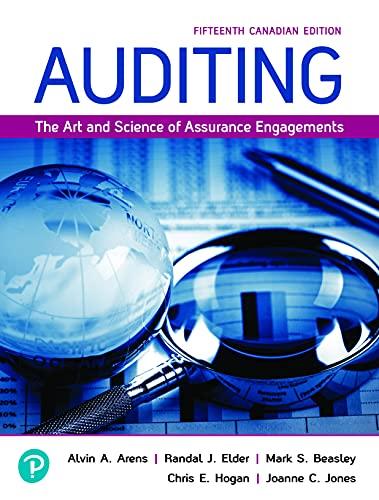This case has two parts: Part I focuses on controls in the control environment and monitoring components
Question:
This case has two parts:
Part I focuses on controls in the control environment and monitoring components (Chapter 8)
Part II focuses on controls in the control activities of a sales process (Chapter 9)
BACKGROUND
RxBar Ltd. is a niche protein bar maker. The company was founded in 2017 in a basement by two childhood friends, Peter Ever and Ralph Franklin, who had an idea to create protein bars that were made of simple ingredients without sugar or additives. Their protein bars were unique in that they only contained three different ingredients—eggs, dates, and nuts. In 2019, the company relocated to a 20 000-square-foot unit in Mississauga. At that time the bars were hand-made and extremely labour-intensive. The company secured funding from investors to finance the automation of the manufacturing process and to hire employees. The loan had a conversion feature that could be triggered by the investors if the current ratio fell below 1.2. If the conversion feature is triggered, every $100 of the loan’s principal value is converted to 10 common shares. As a result of the new financing, the company was able to produce 1.5 million bars and employ 40 people in 2019. A turning point came in early 2020, when the company redesigned its labels. The new labels focused on the short, real food ingredient list and as the two owners put it had a “no B.S.” mantra. The redesign of the label really changed the business, and for the year ended September 30, 2021, the company sold 12 million bars, creating $ 100 million in revenue. RxBar initially sold the bars to exercise gyms in the Greater Toronto Area, and it also established an online presence where customers could purchase bars online with Canada Post delivery. In 2019, the company began to sell nationally at the major grocery store chains (Loblaws, Sobeys, etc.) and also penetrated the U.S. market with sales to major grocery retailers (Whole Foods and Target). Peter and Ralph were recently approached by the multinational cereal company Culwens, who expressed interest in purchasing RxBar. The most striking element for Culwens was RxBar’s outstanding revenue growth. Culwens has asked for audited financial statements to be provided to them by October 31 to assist them in the valuation of RxBar. Peter and Ralph see this opportunity to cash in on a major windfall, they are very excited—the proposed sales price by Culwens is $600 million. The proposed price was based on RxBar’s revenue growth. Shelly Park, the audit senior, has completed some preliminary work regarding evaluation of internal control and you, an audit manager at Fox LLP, are reviewing her working papers. You begin with her documentation of the internal control environment and monitoring controls at the organization.
1. Identify the control weaknesses in RxBar’s components of control documented by Shelly and explain the implication of the weakness for RxBar (what can go wrong), and provide a recommendation to address that control weakness.
2. Do you agree with Shelly’s conclusions that management monitoring over financial reporting is effective? Why or why not?
3. Based upon the information you have been provided, assess overall financial statement risk.
Step by Step Answer:

Auditing The Art And Science Of Assurance Engagements
ISBN: 9780136692089
15th Canadian Edition
Authors: Alvin A. Arens, Randal J. Elder, Mark S. Beasley, Chris E. Hogan, Joanne C. Jones





